Video
youtube
В самое сердечко.
7 notes
·
View notes
Photo

🕯️ the god at the hearth fire—
Devotional art made in homage to Loki,
father of monsters, mother of witches.
Trigger warning: gore, blood.
66 notes
·
View notes
Text
Полнолуние. Слегка запоздалое

21 notes
·
View notes
Text
Огонь Локи. День 13
Да, так вышло, что половину огненного фестиваля я проводила оффлайн и ничего не писала. Сегодня напишу) Сегодня последний день, в который я наконец-то доделала лисичку для Локи. Она уже очень весенняя, правда?
Fox for Loki.

8 notes
·
View notes
Text
Огонь Локи. День 6 (07.07.22)

4 notes
·
View notes
Text
Огонь Локи. День 4 (05/02/22)
Сегодня я благодарю Тебя за отлично проведённый с нами праздник и приключения) Сегодня мы втроём праздновали Имболк, в нашем календаре это день Лодура, праздник дара огня и крови и, конечно, рождения ведьм. С огнём, поеданием сердец и прочими радостями. И конечно же ни один Локин ритуал не проходит без приключений. Мы в тонусе, Локи весело — всем хорошо 🔥
Сегодняшний день начался с хороших предзнаменований.
🔥Подарок для Локи, который должен был приехать 7 февраля и планировался к вручению несколько позже (в финале огненного фестиваля), приехал сегодня за полчаса до отъезда в лес. Я успела за ним сбегать и вживую эта красота выглядит ещё лучше, чем на фото.
🔥По дороге прояснялось небо (а оно было пасмурным), на выезде из города нас будто бы проводила одна сорока, а на подъезде к месту встретила другая. Да, сорок я тоже отношу к птичкам Локи наравне с соколами и коршунами.
🔥Лес встретил тишиной, но буквально за несколько минут до начала ритуала наполнился голосами птиц.
🔥Костёр, который никак не хотел гореть, на финальном ритуальном аккорде загорелся ярко и чисто.
🔥Безалкогольный напиток в роге после благословления ощущался как алкогольный и по вкусу, и по ощущениям, из чего родилась шутка, что мы превратили сок в вино.
🔥Приключения в виде застрявшей в сугробах машины и неожиданно быстро возникшей помощи с лопатой. Холод, который как рукой сняло в ходе ритуала. Так и не пожаренная еда... Это всё нисколько не расстроило, наоборот возникло ощущение дурацкого счастья. Ах да, я ещё извалялась в снегу, провалившись в сугроб по самые бёдра. Такие приключения в холодном зимнем лесу могут показаться кому-то неприятными, но нам понравилось. Даже мне, учитывая мою любовь к планам и структурированности бытия.
Blessed with fire 🔥🔥🔥

2 notes
·
View notes
Text
Огонь Локи. День 2
Лёгкий как небо Сын леса и молний, Лофт ветроногий, Весну приносящий, Даруй мне порыв Свежего ветра, Лёгкость на сердце И взор соколиный.
Да, аккурат на Имболк помимо огня очень сильно почувствовался поток свежего воздуха. Поэтому к Лодуру присоединяется Лофт)

1 note
·
View note
Text
Огонь Локи. День 1
Я решила проводить фестиваль огней полупублично, ибо благодарности пишу на бумаге каждый день и складываю в котелок, чтобы 14 числа, когда наберётся тринадцать записок, сжечь их, отправив по адресу. Но это не значит, что не буду писать в это время сюда интересное и/или красивое про Локи (в особенности в аспекте Лодура и Отца Ведьм).

1 note
·
View note
Text
Имболк и начало огненного фестиваля
Сверкающий ясно Бог в алом и золоте, Искру пламени жизни Даруй мне о, Лодур, Светлый, как звёзды.
Фрагмент вчерашнего ритуала-старта огненного фестиваля и не только.
О фестивале тут: https://t.me/ru_lokean/308

2 notes
·
View notes
Text
You know what I've noticed? People who complain about the "new age" or "wiccan" influence in Norse Heathenry seem to really just be bothered by people treating it like a living spirituality.
But ironically, treating Norse Heathenry as a living spirituality is probably the most historically-accurate thing we can do with it.
Norse Heathenry is like a city that's stood for a thousand years, in that it's a product of new things built on top of old things. And even the old things are sometimes updated or even tossed out because they no longer serve the times. If we look at its entire history from the Bronze Age to today, we can see that it's always changed with the advancement of technology, and that it's always had its regional and local differences.
To claim that something is "new age" in Norse Heathenry because it looks contemporary misses the point completely.
(Also, I've noticed that most of the "new age/wiccan" complaints are specifically about people personally interacting with deities and spirits and using newer methods to accomplish this...but this is perhaps one of the oldest traits about Norse Heathenry. I'm curious to know who's telling people this is a new thing.)
176 notes
·
View notes
Photo
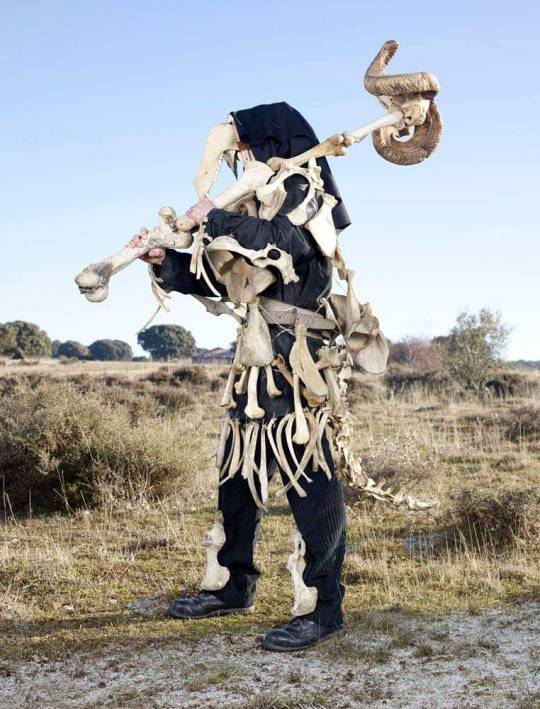
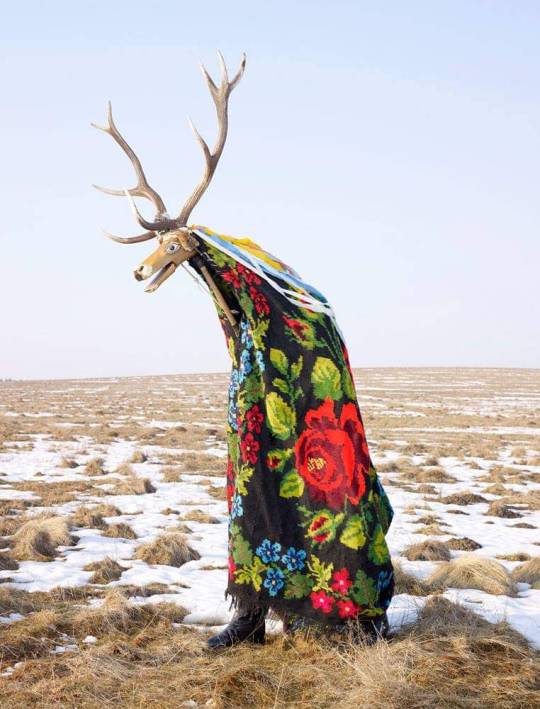
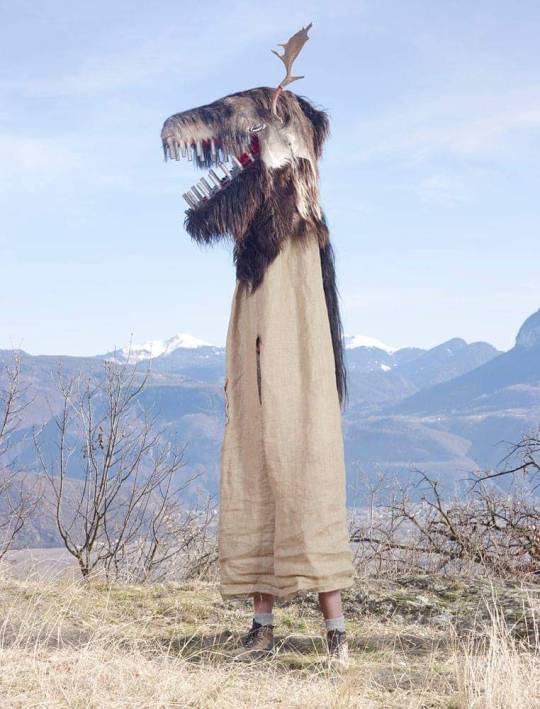
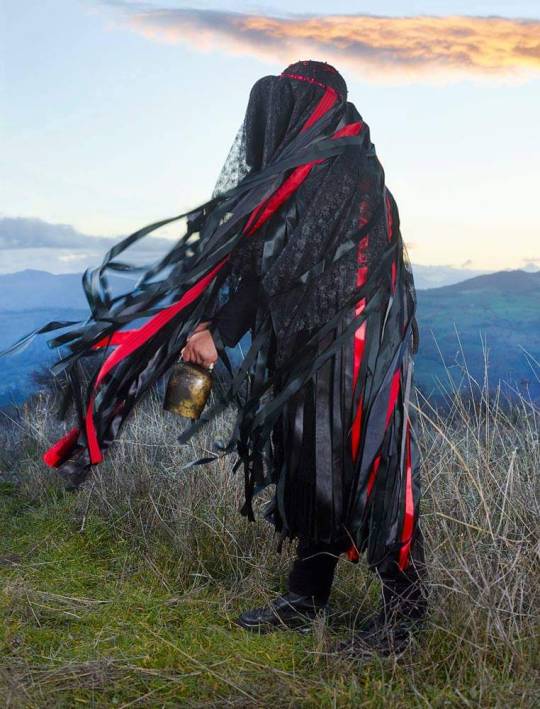
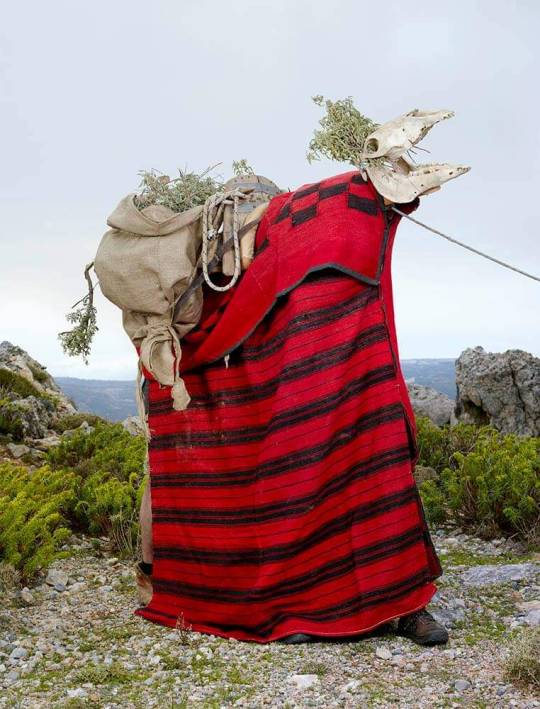
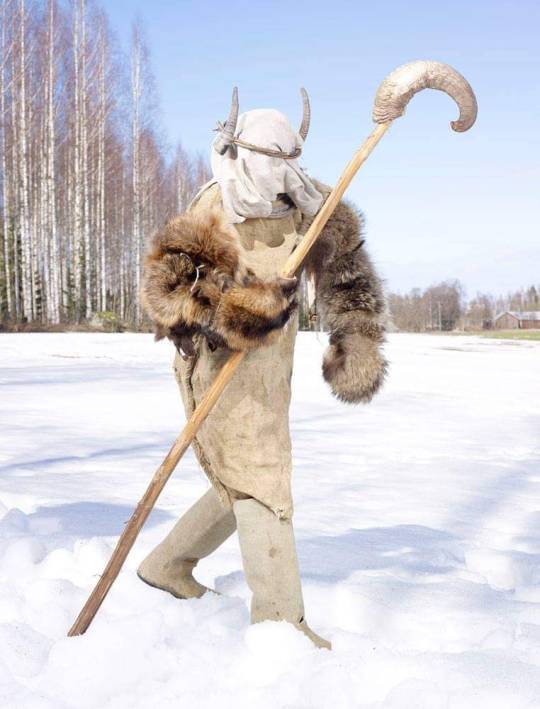
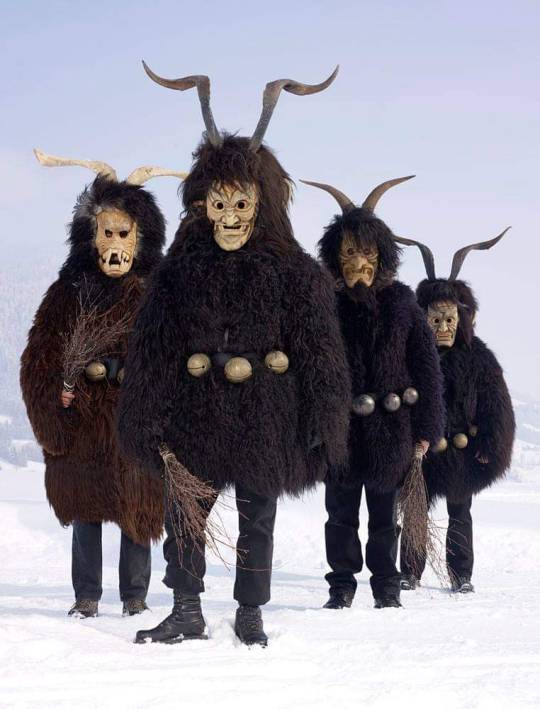
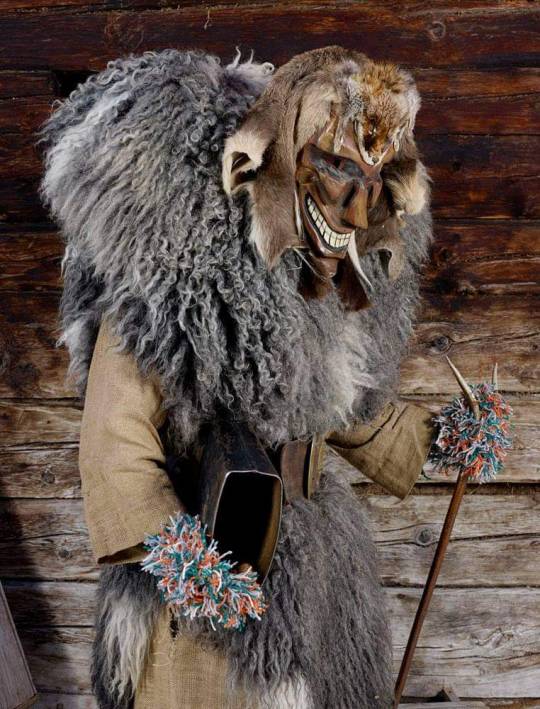
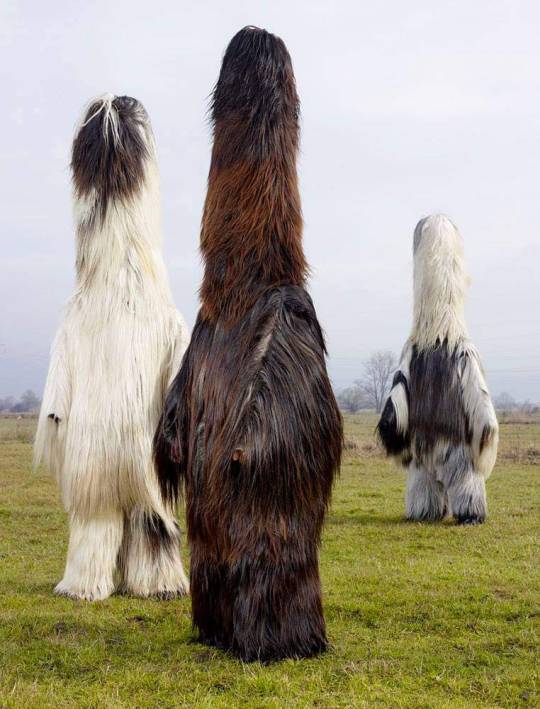
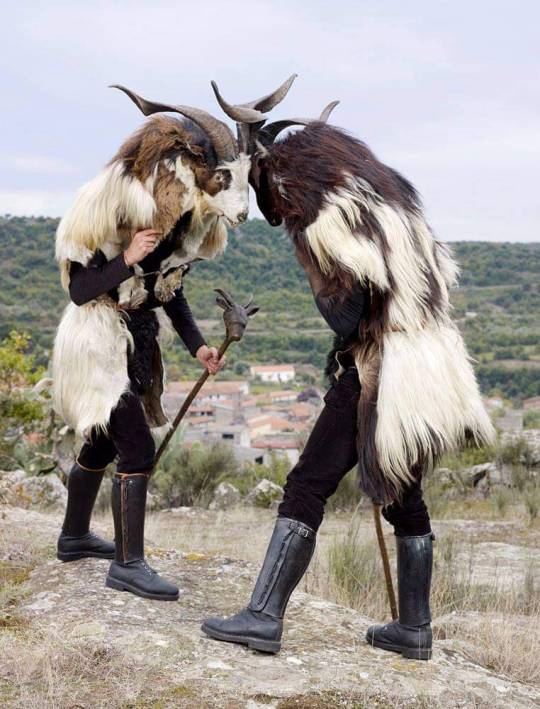
Traditional European Christmas time monsters, photographer across the Europe by Charles Fréger.
74K notes
·
View notes
Photo
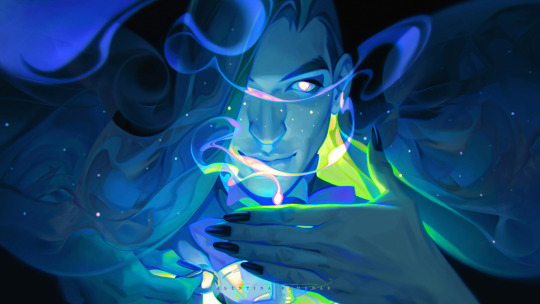


Here’s a small collection of some of my favorite works which I did this year. Happy New Year everyone!
Official site | YouTube | Instagram | DeviantART | ArtStation | Twitter
9K notes
·
View notes
Link
Hello, witches! Since I’m always harping on about learning your history and checking your sources, I thought I’d help folks get a head start by compiling some source material.
To that end, I’ve started a Dropbox folder with a stash of historical texts on witchcraft, magic, and related topics. Nearly everything I’ve managed to find so far is public domain (thank you Project Gutenberg), with the exception of a very thorough herbal grimoire I found online some years ago and a book of witchcraft from the 1970s that appears to be out of print.
I will be continuing in this vein with future texts that I find. Everything will be public domain or cited to the source that it came from, in PDF format. I will NOT be including PDFs of any book currently in circulation with a copyright linked to a living author or estate. The point of this folder is that everything in it should be free for sharing and open use as research materials.
Below is the initial list of titles. I tried to include as many as I could find, with a focus on some oft-cited classics. I will be adding new texts as I find them.
A Collection of Rare and Curious Tracts on Witchcraft and the Second Sight, by David Webster (1820)
A History of Witchcraft in England from 1558 to 1718, by Wallace Notestein (1909)
British Goblins, Welsh Folk-lore, Fairy Mythology, Legends and Traditions, by Wirt Sikes (1880)
Curiosities of Superstition, by W. H. Davenport Adams (1882)
Daemonologie, by King James I/VI (1597)
Fairy and Folk Tales of the Irish Peasantry, Edited and Selected by W. B. Yeats (1888)
Irish Witchcraft and Demonology, by St. John Drelincourt Seymour (1913)
La Sorcière, or The Witch of the Middle Ages, by Jules Michelet (1863)
Lives of the Necromancers, by William Godwin (1834)
Magic and Fetishism, by Alfred C. Haddon (1906)
Magic and Witchcraft, by Anonymous (1852)
Modern Magic, by M. Schele de Vere (1873)
Plant Lore, Legends, and Lyrics, by Richard Folkard (1884)
Practical Psychomancy and Crystal Gazing, by William Walker Atkinson (1908)
The Devil in Britain and America, by John Ashton (1896)
The Discoverie of Witchcraft, by Reginald Scot (1594, 1886 reprint)
The Extremely Large Herbal Grimoire (date unknown, internet publication)
The Golden Bough : A Study of Magic and Religion, by Sir James George Frazer (1890)
The Illustrated Key to the Tarot, by L.W. de Laurence (1918)
The Magic of the Horse-shoe, by Robert Means Lawrence (1898)
The Mysteries of All Nations, by James Grant (1880)
The Mystery and Romance of Alchemy and Pharmacy, by Charles John Samuel Thompson (1897)
The Superstitions of Witchcraft, by Howard Williams (1865)
The Witchcraft Delusion in Colonial Connecticut by John M. Taylor (1908)
The Wonders of the Invisible World, by Cotton Mather and A Farther Account of the Tryals of the New-England Witches, by Increase Mather (1693, 1862 reprint)
Witch Stories, by E. Lynn (Elizabeth Lynn) Linton (1861)
Witch, Warlock, And Magician, by W. H. Davenport Adams (1889)
Witchcraft & Second Sight in the Highlands & Islands of Scotland, by John Gregorson Campbell (1902)
Witches’ Potions & Spells, ed. by Kathryn Paulsen (1971)
Disclaimer: Please keep in mind that these texts are (with few exceptions) more than a century old, and may contain depictions, references, or language that are outdated and inappropriate. The point of including these documents is to provide access to historical texts for research and reference. Inclusion in the collection does not equal unconditional agreement with or wholesale approval of the contents.
Take everything with a grain of salt and remember to do your due diligence!
Happy Witching! -Bree
8K notes
·
View notes
Photo

Brian Froud, ‘The Magician’, “Realms of Fantasy”, Vol. 1 #1, 1994. Source
257 notes
·
View notes
Text
Respecting the Gods
Don’t… treat them as tools. Deities aren’t obligated to help you, even if you do everything “correctly” to ask. They’re not vending machines, or a list of correspondences that only gets value from how they best serve you. They’re gods! Instead… treat them like people. (Really high-status people.) Build a relationship before asking big favors. Compensate them for their time. Respect they have their own autonomy. Respect that your will is not the center of their universe.
Don’t… reduce them into archetypes. Putting Frejya or Aphrodite into just “love goddess” takes out so much of their depth. (Example, both of these goddesses also have warlike aspects.) Putting them into narrow categories and treating all deities that fit as the same can be reductive at best and insensitive to the root cultures at worst. Instead… address who you’re really talking to. Do your research. See how a god either lines up with or defies your assumptions. See what makes them different from a deity with a similar domain. If you wish to speak to the Horned God, speak to the Horned God, and if you want to speak to Cernunnos or Pan, call them Cernunnos or Pan. Don’t… ignore the lore. UPG Can certainly exist and add depth, but the lore has survived and is what all these gods are largely founded on. It’s important for us to recognize it and know who we’re approaching. Instead… do your research beforehand. Did you know Aphrodite is widely considered to HATE pigs and be offended with offerings of pork or images of pigs on the altar? Might be a good thing to know before you accidentally offer some fresh bacon. (But if you recognize the lore and find a way to spin it so it works, more power to you~) Don’t… insult other people’s gods. If those gods don’t resonate with you, they have a lot of meaning for other good people. I’m tempted to say don’t insult your own, either. Playful banter is one thing, but there’s a line between affectionate jabs and straight up disrespect. Find where that line is for you. Instead… talk to other people. If something about a god you don’t worship feels problematic, talk to their followers and devotees and see what they have to say about it. They probably have an approach you haven’t been exposed to. Analyze your own relationships with deities. And if the way you speak about a deity makes someone else uncomfortable or upset, respect their right to feel that way, apologize, and learn from it. Remember that each deity has changed someone’s life for the better.
9K notes
·
View notes
